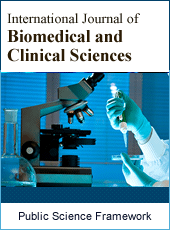International Journal of Biomedical and Clinical Sciences
Articles Information
International Journal of Biomedical and Clinical Sciences, Vol.4, No.1, Mar. 2019, Pub. Date: Mar. 19, 2019
Management of Malaria Among Health Workers in Public Health Facilities in Nigeria: Comparative Analysis Between Global Fund-supported and Non-Global Fund-supported Sites
Pages: 1-10 Views: 2058 Downloads: 437
[01]
Ibanga Ekong, Department of Community Health, University of Uyo, Uyo, Nigeria.
[02]
Emeka Onugu, Catholic Relief Services, Ahmadu Bello Way, Abuja, Nigeria.
With stalling of progress in malaria control globally, and with Nigeria as the worst hit, the need to review implementation strategies, including the training of health workers in Primary Health Care facilities, towards an effective malaria control implementation process. This was an observational-comparative study which compared knowledge and practices of health workers between Global Fund-supported and non-Global Fund supported Primary Health Care (PHC) facilities. There was a significantly positive difference in knowledge and practices in Global Fund-supported facilities who had received more trainings in terms of diagnosis, malaria case management, Health Management Information System, and Logistics Management Information System. There is a need for structured trainings for health workers in PHCs to ensure health systems development, and ultimately, effective malaria control.
Health Facility, Training, Health Workers
[01]
World malaria report 2018. Geneva: World Health Organization; 2018. License: CC BY-NC-SA 3.0 IGO.
[02]
National Malaria Elimination Programme (NMEP), National Population Commission (NPoPC), National Bureau of Statistics (NBS), and ICF International, 2016. Nigeria Malaria Indicator Survey 2015. Abuja, Nigeria, and Rockville, Maryland, USA: NMEP, NPoPC, and ICF International.
[03]
National Malaria Elimination Programme (NMEP), National Population Commission (NPoPC), National Bureau of Statistics (NBS), and ICF International, 2011. Nigeria Malaria Indicator Survey 2010. Abuja, Nigeria, and Rockville, Maryland, USA: NMEP, NPoPC, and ICF International.
[04]
Towards a Harmonized Approach for Health Facility Assessments: Vision, Guiding Principles and Roadmap. Outcome of a Technical Consultation; Geneva: 12-13 November 2014. Accessed online at www.who.int>healthinfo>hfa_meeting on 1 December 2018.
[05]
Musoke D, Boynton P, Butler C, and Musoke MB. Health Seeking Behaviour and Challenges in Utilizing Health Facilities in Wakiso District, Uganda. Afr Health Sci. 2014 Dec; 14 (4): 1046-1055.
[06]
Adam VY, and Aigbokhaode AQ. Sociodemographic Factors associated with the Healthcare Seeking Behaviour of Heads of Households in a Rural Community in Southern Nigeria. Sahel Medical Journal 2018; 21 (2): 31-36.
[07]
Musinguzi G, Anthierens S, Nuwaha F, Geerrtruyden JP, et al. Factors Influencing Compliance and Health Seeking Behaviour for Hypertension in Mukono and Buikwe in Uganda: A Qualitative Study. International Journal of Hypertension 2018, Article ID 8307591, 13 pages.
[08]
Yu D, Souteyran Y, Banda MA, Kaufman J, Perriens JH. Investment in HIV/AIDS programs: Does it help strengthen health systems in developing countries? Globalization and Health 2008, 4: 8.
[09]
Kim JY, Gilks CF. Scaling up treatment – why we can’t wait. New England Journal of Medicine 2005, 353: 2352-2354.
[10]
Steinhardt LC, Chinkhumba J, Wolkon A, Luka M, Luhanga M, et al. (2014) Quality of Malaria Case Management in Malawi: Results from a Nationally Representative Health Facility Survey. PLoS ONE 9 (2): e89050. doi: 10.1371/journal.pone.0089050.
[11]
Chinawa JM. Factors militating against effective implementation of primary health care (PHC) system in Nigeria. Ann Trop Med Public Health 2015; 8: 5-9.
[12]
Shaw RP, Wang H, Kress D and Hovig D. Donor and Domestic Financing of Primary Health Care in Low Income Countries. Health Systems and Reforms 2015; 1 (1): 72-88.
[13]
Lippeveld T, Sauerborn R, Bodart C (eds). 2000 Design and implementation of health information systems. Geneva: World Health Organization.
[14]
Campbell B. 1997. Health management information systems in lower income countries: an analysis of system design, implementation and utilization in Ghana and Nepal. Amsterdam: Royal Tropical Institute.
[15]
Manso JF, Annan J, and Sovoe-Anane S. Assessment of Logistics Management in Ghana Health Service. Accessed online at https://www.thejournalofbusiness.org/index.php/site/article/download/267/280 on 6 Dec. 2018.
[16]
Quantification of Public Health Commodities Toolkit- K4 Health. Accessed online at https://www.k4health.org/printpdf/book/export/html/49596 on 5 Dec. 2018.
[17]
Addressing Challenges to Antimalarial Access and Malaria Case Management, 7 & 8 December, Addis Ababa, Ethiopia. Accessed online at https://www.mmv.org/sites/default/files/uploads/docs/publications/AdressingChallenge_Access_EN.pdf on 4 Dec. 2018.
[18]
Kumurya AS. Supply Chain Management of Health Commodities and Logistics: Fundamental Components of Booming Medical Laboratory Services. 2015; European Journal of Logistics, Purchasing and Supply Chain Management Vol. 3, No. 4, pp. 62-72.
[19]
Garmaise D. Global Fund’s efforts to improve service quality: successes and challenges. Accessed online at www.aidspan.org/gfo_article/global0fund’s-efforts-improve-service-quality-successes-challenges on 2 December 2018.
[20]
Gosling J, Case P, Tulloch J, et al. Effective program management: a cornerstone of malaria elimination. Am J Trop Med Hyg. 2015; 93 (1): 135-8.
[21]
Woyessa A, Kebede A and Hadis M. Human Resource Capacity to Effectively Implement Malaria Elimination in Ethiopia (SURE policy brief). Addis Ababa, Ethiopia: Technology Transfer and Research Translation Directorate, Ethiopian Health and Nutrition Research Institute, 2010. www.evipnet.org/sure
[22]
Ethiopian Health and Nutrition Research Center. Ethiopia Global Fund Facility Survey 2008. Geneva, Switzerland. Global Fund 2009.

ISSN Print: Pending
ISSN Online: Pending
Current Issue:
Vol. 7, Issue 1, March Submit a Manuscript Join Editorial Board Join Reviewer Team
ISSN Online: Pending
Current Issue:
Vol. 7, Issue 1, March Submit a Manuscript Join Editorial Board Join Reviewer Team
| About This Journal |
| All Issues |
| Open Access |
| Indexing |
| Payment Information |
| Author Guidelines |
| Review Process |
| Publication Ethics |
| Editorial Board |
| Peer Reviewers |


